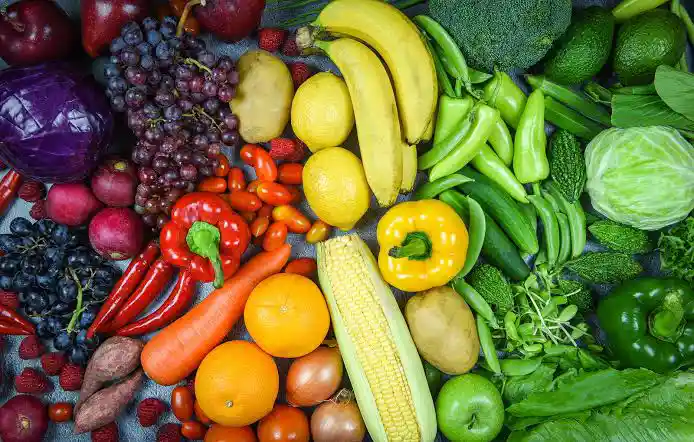Good vision is essential for a high quality of life, and maintaining eye health goes beyond regular check-ups and proper lighting. Your diet plays a pivotal role in protecting your eyes and preserving your vision as you age. Certain superfoods are packed with nutrients that can help reduce the risk of eye diseases, improve vision, and keep your eyes functioning at their best.
In this article, we’ll explore the top superfoods for eye health, the essential nutrients they provide, and tips for incorporating them into your diet to support better vision.
Why Nutrition Matters for Eye Health
Your eyes are highly complex organs that require specific nutrients to function properly and stay healthy. Without the right nutrition, the risk of developing vision problems such as macular degeneration, cataracts, and dry eye syndrome increases significantly.
Key nutrients for eye health include:
- Vitamin A: Essential for maintaining good vision and preventing night blindness.
- Lutein and Zeaxanthin: Antioxidants that protect the retina from harmful blue light and reduce the risk of macular degeneration.
- Omega-3 Fatty Acids: Support retinal health and reduce inflammation.
- Vitamin C and Vitamin E: Powerful antioxidants that protect the eyes from free radical damage.
- Zinc: Helps transport vitamin A from the liver to the retina for melanin production, which protects the eyes.
Top 10 Superfoods for Better Vision
1. Carrots
Carrots are one of the most well-known foods for eye health because they are rich in beta-carotene, a type of vitamin A that helps maintain good vision. Beta-carotene also protects against night blindness and reduces the risk of macular degeneration. A daily serving of carrots, whether raw in salads or cooked in soups, can provide a significant boost to your eye health.
3 Foods That May Not Be Good for Your Eye Health
2. Leafy Greens
Vegetables like spinach, kale, and collard greens are packed with lutein and zeaxanthin, two powerful antioxidants found in the retina. These nutrients help filter harmful blue light and protect the eyes from oxidative damage. Including leafy greens in your diet, such as in smoothies, salads, or stir-fries, can help maintain healthy vision over time.
3. Fatty Fish
Salmon, mackerel, sardines, and tuna are rich sources of omega-3 fatty acids, which are crucial for retinal health and reducing inflammation in the eyes. Omega-3s also help prevent dry eye syndrome and improve overall eye comfort. Aim to include fatty fish in your meals at least twice a week for maximum benefits.
4. Eggs
Egg yolks are a great source of lutein, zeaxanthin, vitamin A, and zinc. These nutrients work together to reduce the risk of night blindness, macular degeneration, and cataracts. Adding eggs to your breakfast or incorporating them into recipes is an easy way to support your eye health.
5. Citrus Fruits
Oranges, grapefruits, lemons, and limes are rich in vitamin C, a potent antioxidant that helps protect the eyes from free radical damage and reduces the risk of cataracts and age-related macular degeneration (AMD). Start your day with a glass of fresh orange juice or add citrus fruits to your snacks or desserts for a vitamin C boost.
6. Nuts and Seeds
Almonds, walnuts, sunflower seeds, and flaxseeds are excellent sources of vitamin E and omega-3 fatty acids, which help protect the eyes from oxidative stress. A handful of nuts or seeds as a snack or sprinkled over your meals can provide a nutritional boost for your vision.
7. Sweet Potatoes
Like carrots, sweet potatoes are packed with beta-carotene, which the body converts into vitamin A. This nutrient is vital for maintaining the health of the retina and preventing night blindness. Roasted sweet potatoes or mashed sweet potato dishes make for a delicious and eye-friendly addition to your diet.
8. Bell Peppers
Brightly colored bell peppers are high in vitamin C, making them excellent for strengthening blood vessels in the eyes and reducing the risk of cataracts. Their crunchy texture and sweet flavor make them a versatile addition to salads, stir-fries, or as a snack with hummus.
9. Blueberries
Blueberries are rich in anthocyanins, powerful antioxidants that reduce inflammation and oxidative stress in the eyes. These berries also improve circulation to the retina, enhancing overall eye health. Enjoy blueberries as a topping for yogurt, in smoothies, or as a healthy snack.
10. Whole Grains
Foods like quinoa, brown rice, oats, and whole wheat bread are high in zinc and vitamin E, which help protect against macular degeneration. Whole grains also have a lower glycemic index, which reduces the risk of diabetic retinopathy. Swap refined grains for whole grains in your meals to promote better eye health.
Tips for Incorporating Superfoods into Your Diet
- Start Small: Add one or two superfoods to your daily meals and gradually increase your intake.
- Blend Smoothies: Combine leafy greens, citrus fruits, and berries into a delicious smoothie for a nutrient-packed breakfast.
- Snack Smart: Keep nuts, seeds, or baby carrots handy for healthy snacking.
- Experiment with Recipes: Include sweet potatoes, fatty fish, or whole grains in creative dishes like casseroles, salads, or soups.
- Meal Prep: Plan your meals ahead to ensure a balanced diet that includes eye-friendly foods.
Lifestyle Habits to Support Eye Health
In addition to a nutrient-rich diet, adopting healthy habits can further protect your vision:
- Wear Sunglasses: Protect your eyes from harmful UV rays by wearing sunglasses with 100% UV protection.
- Take Breaks: Follow the 20-20-20 rule—every 20 minutes, look at something 20 feet away for 20 seconds to reduce eye strain.
- Stay Hydrated: Drink plenty of water to keep your eyes hydrated and reduce the risk of dry eye syndrome.
- Avoid Smoking: Smoking increases the risk of macular degeneration and cataracts. Quitting smoking can significantly improve your eye health.
- Regular Eye Exams: Visit your eye doctor annually to monitor your vision and detect any issues early.
Frequently Asked Questions (FAQs)
This is for informational purposes only. For medical advice or diagnosis, consult a professional.
What is the best supplement for eyesight?
-
- AREDS2: This is a formulation of vitamins and minerals shown to reduce the risk of age-related macular degeneration (AMD) in some studies. It typically includes lutein, zeaxanthin, vitamin C, vitamin E, zinc, and copper.
Which oil is best for eyesight?
-
- Fish oil: Rich in omega-3 fatty acids, particularly DHA, which are essential for eye health.
What drink is good for eyesight?
-
- Carrot juice: Carrots are a good source of vitamin A, which is crucial for night vision.
- Water: Staying hydrated is essential for overall eye health.
How to fix blurry vision naturally?
-
- Eye exercises: Simple exercises like focusing on distant and near objects can help improve eye focus.
- Rest your eyes: Take frequent breaks from screens to reduce eye strain.
- Maintain a healthy diet: Include plenty of fruits, vegetables, and foods rich in omega-3s.
- Get enough sleep: Adequate sleep is essential for eye health.
Which seed is best for eyesight?
-
- Flaxseeds: Rich in omega-3 fatty acids, which are beneficial for eye health.
- Chia seeds: Another excellent source of omega-3s.
- Sunflower seeds: Good source of vitamin E and zinc, which are important for eye health.
Which fruit is a miracle for eyesight?
-
- Blueberries: Rich in antioxidants, including anthocyanins, which may help protect eye health.
What is a superfood for eyes?
-
- Spinach: Packed with lutein, zeaxanthin, and vitamin C, which are essential for eye health.
What are the 3 nutrients for better vision?
-
- Lutein and zeaxanthin: These carotenoids protect the macula, a part of the retina responsible for central vision.
- Omega-3 fatty acids: Essential for maintaining healthy eye structures.
- Vitamin C: An antioxidant that helps protect eye tissues from damage.
What foods improve eyesight naturally?
-
- Leafy green vegetables: Spinach, kale, and collard greens are excellent sources of lutein and zeaxanthin.
- Carrots: Rich in vitamin A, essential for night vision.
- Fatty fish: Salmon, tuna, and mackerel are good sources of omega-3s.
- Citrus fruits: Rich in vitamin C.
- Eggs: Contain lutein and zeaxanthin.
- Nuts and seeds: Good sources of vitamin E and zinc.
1. Can eating carrots improve my vision?
Carrots are rich in beta-carotene, which the body converts into vitamin A. While they won’t improve your vision beyond its natural capacity, they help maintain healthy eyesight and prevent night blindness.
10 Foods That May Not Be Good for Your Eye Health
2. Are supplements necessary for eye health?
Supplements can be beneficial if you have specific deficiencies or conditions, but a balanced diet rich in eye-friendly nutrients is usually sufficient. Consult your doctor before starting any supplements.
3. Can omega-3 fatty acids really prevent dry eyes?
Yes, omega-3 fatty acids found in fatty fish and seeds help reduce inflammation and improve tear production, reducing the symptoms of dry eye syndrome.
4. How does vitamin C help the eyes?
Vitamin C is an antioxidant that strengthens blood vessels in the eyes, reduces the risk of cataracts, and slows the progression of macular degeneration.
5. Can I reverse vision problems with diet?
While diet alone cannot reverse vision loss caused by advanced eye diseases, it can slow progression, reduce risks, and support overall eye health.
Conclusion
Your diet is a powerful tool for protecting your eyes and maintaining good vision. Incorporating superfoods like carrots, leafy greens, fatty fish, and citrus fruits into your meals provides the essential nutrients needed for optimal eye health. By combining these foods with healthy lifestyle habits and regular eye check-ups, you can enjoy better vision and a lower risk of eye-related problems.
Start making these dietary changes today—your eyes will thank you!
Disclaimer: It is very important to note that this information is for general knowledge and informational purposes only and does not constitute medical advice. Always consult with an eye doctor or healthcare professional for any concerns about your vision or eye health.
Dietary supplements should be taken under the guidance of a healthcare professional.







